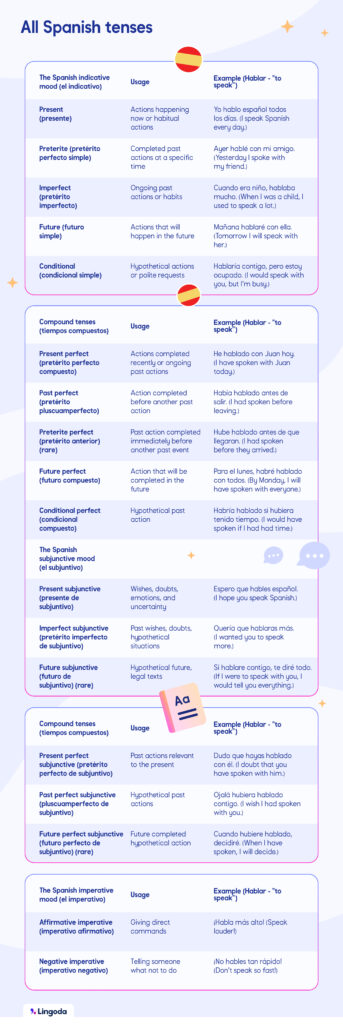All Spanish tenses made easy: A breakdown

Just like with any other language, if we’re looking to become fluent in Spanish we need to get (very) acquainted with all types of tenses in Spanish and their correct usage. This is key for communicating effectively and clearly.
And, yes, verb conjugation can be, unsurprisingly, one of the trickiest parts of learning Spanish, but with time and practice, you’ll become a natural. So, let’s take a look at this overview of all Spanish tenses, how to use them and example sentences. Ready, set, go!
- Understanding Spanish verb tenses and moods
- How many Spanish tenses are there?
- The Spanish indicative mood (el indicativo)
- The Spanish subjunctive mood (el subjuntivo)
- FAQs

Learn Spanish with Lingoda
How it works

Understanding Spanish verb tenses and moods
When we talk about Spanish tenses, we’re talking about time. Just like in English, tenses in Spanish help us explain when an action (verb) takes place – whether it has already happened, is happening or will happen. To indicate this, we conjugate the verb form appropriately (we add, for example, a particular ending to the infinitive form).
Now, Spanish verb conjugations are divided into different ‘moods’ depending on the speaker’s intention, and understanding them will help us distinguish between tenses. The three grammatical moods in Spanish are:
- Indicative: We use it to express facts and objective information. For example:
- Yo corro dos veces a la semana (I run twice a week).
- Minerva fue al dentista (Minerva went to the dentist).
- Hoy cenaremos pasta (We’ll have pasta for dinner).
- Subjunctive: For showing possibilities, doubts, feelings, desires and opinions.
- Ojalá vayamos al cine mañana (I hope we go to the movies tomorrow).
- Espero que la hayas pasado bien (I hope you had a good time).
- Es importante que guardemos silencio (It’s important that we keep quiet).
- Imperative: This is for giving commands and orders.
- Ponte el sombrero (Wear the hat).
- ¡No te pares ahí! (Don’t stand there!).
- Pásame la sal (Pass me the salt).
Do you want to know more about Spanish grammar? With Lingoda, you can learn it from native teachers in live, interactive classes!
How many Spanish tenses are there?
Okay, we now know what Spanish tenses are and what they can do for us. But how many are there exactly? Well, the most common tenses are past, present and future (illustrated in the three examples given for the indicative mood), but there are 18 in total. These are categorized into simple and compound sentences:
- Simple tenses: These only have one verb – yo corro (I run).
- Compound tenses: The main verb is accompanied by the auxiliary verb haber (have), which is placed before the main verb in the past participle: Yo he corrido (I have run).
Now, are you ready for an overview of all Spanish tenses? Let’s dive into the different types of tenses in Spanish, which we have classified by mood and simple and compound tenses below.

The Spanish indicative mood (el indicativo)
These are the tenses that make up the indicative mood:
Simple tenses (tiempos simples)
These are the most common tenses and you’re likely to use them often:
The present tense in Spanish (presente): We use it to talk about something that is happening now or about habits.
We form this tense by removing the -ar, -er or -ir ending from the infinitive form and replacing it with the ending that fits the pronoun. Here’s a chart with the new endings:
| Pronoun | -ar | -er | -ir |
| yo (I) | -o | -o | -o |
| tú (you) | -as | -es | -es |
| él, ella, eso (he, she, it) | -a | -e | -e |
| ustedes (you - plural) | -an | -en | -en |
| nosotros/as (we) | -amos | -emos | -imos |
| ellos, ellas (they) | -an | -en | -en |
Examples:
- Escalar (to climb): Escalo todos los fines de semana (I climb/go climbing every week).
- Correr (to run): Ellas corren en las noches (They run at night).
- Vivir (to live): Nosotros vivimos en España (We live in Spain).
Preterite (pretérito): To speak about an event that happened at a certain point in the past. To conjugate it, we also change the infinitive’s ending for another:
| Pronoun | -ar | -er / -ir |
| yo (I) | -é | -í |
| tú (you) | -aste | -iste |
| él, ella, eso (he, she, it) | -ó | -ió |
| ustedes (you - plural) | -aron | -ieron |
| nosotros/as (we) | -amos | -imos |
| ellos, ellas (they) | -aron | -ieron |
- Escalé el fin de semana (I climbed last weekend).
- Ellas corrieron en la noche (They ran at night).
- Nosotros vivimos en España el año pasado (We lived in Spain last year).
Imperfect (pretérito imperfecto): To talk about past events without a specific end. For example, we use it to talk about past habits or events that weren’t completed –in English, we would translate it as ‘used to’:
| Pronoun | -ar | -er / -ir |
| yo (I) | -aba | -ía |
| tú (you) | -abas | -ías |
| él ella, eso (he, she, it) | -aba | -ía |
| ustedes (you - plural) | -aban | -ían |
| nosotros/as (we) | -ábamos | -íamos |
| ellos, ellas (they) | -aban | -ían |
- Escalaba seguido (I used to climb often).
- Ellas corrían para ir a la escuela (They used to run to school).
- Nosotros vivíamos en España, pero nos mudamos (We used to live in Spain, but we moved).
The future tense in Spanish (futuro): We use it to talk about the future (something that will or may happen). In English, it would be equivalent to the form ‘will + verb’.
For this tense and for regular verbs, all endings are the same regardless of the verb. All we have to do is add these endings to the infinitive form:
| Pronoun | -ar / -er / -ir |
| yo (I) | -é |
| tú (you) | -ás |
| él, ella, eso (he, she, it) | -á |
| ustedes (you - plural) | -án |
| nosotros/as (we) | -emos |
| ellos, ellas (they) | -án |
- Escalaré mañana (I will climb tomorrow).
- Ellas correrán la carrera (They will run the race).
- Nosotros viviremos en España algún día (We’ll live in Spain one day).
Conditional (condicional): We use it to make requests or talk about hypotheticals. This tense’s’ conjugation is similar to the future tense and in English it would be equivalent to ‘would + verb’:
| Pronoun | -ar / -er / -ir |
| yo (I) | -ía |
| tú (you) | -ías |
| él, ella, eso (he, she, it) | -ía |
| ustedes (you - plural) | -ían |
| nosotros/as (we) | -íamos |
| ellos, ellas (they) | -ían |
- Escalaría más si fuera tú (I’d climb more often if I were you).
- Ellas correrían si pudieran (They’d run if they could).
- No sé si viviríamos en España (I don’t know if we’d ever live in Spain).
Compound tenses (tiempos compuestos)
Present perfect (pretérito perfecto): For actions that were completed recently or for something that started in the past and is ongoing. We form it with a conjugated haber (have/has) + the main verb in past participle:
| Pronoun | Haber |
| yo (I) | he |
| tú (you) | has |
| él, ella, eso (he, she, it) | ha |
| ustedes (you - plural) | han |
| nosotros/as (we) | hemos |
| ellos, ellas (they) | han |
- He escalado mucho este mes (I’ve climbed a lot this month).
- Ellas han corrido ya (They’ve already run).
- Nosotros hemos vivido en España por años (We’ve lived in Spain for years).
Past perfect (pluscuamperfecto): To describe an action that was completed before another. Just like with the tense above, we also use a conjugated form of haber + main verb in p.p. (in English: had + p.p. verb):
| Pronoun | Haber |
| yo (I) | había |
| tú (you) | habías |
| él, ella, eso (he, she, it) | había |
| ustedes (you - plural) | habían |
| nosotros/as (we) | habíamos |
| ellos, ellas (they) | habían |
- Yo ya había escalado antes de que llegaras (I had already climbed before you arrived).
- Ellas ya habían corrido a esa hora (They had already run by that time).
- Nosotros ya habíamos vivido en España antes (We had already lived in Spain before).
Preterite perfect (pretérito anterior): To express an action in the past that happened right before another action in the past. This is very uncommon and reserved for extremely formal language.
| Pronoun | Haber |
| yo (I) | hube |
| tú (you) | hubiste |
| él, ella, eso (he, she, it) | hubo |
| ustedes (you - plural) | hubieron |
| nosotros/as (we) | hubimos |
| ellos, ellas (they) | hubieron |
- En cuanto hube corrido, llegó Sol (After I had run, Sol arrived).
Future perfect (futuro perfecto): To describe a future action that will happen before another action in the future. In English, it would be equivalent to ‘will have + p.p. verb’.
| Pronoun | Haber |
| yo (I) | habré |
| tú (you) | habrás |
| él, ella, eso (he, she, it) | habrá |
| ustedes (you - plural) | habrán |
| nosotros/as (we) | habremos |
| ellos, ellas (they) | habrán |
- Habré escalado ya para cuando tú llegues (I will have already climbed by the time you arrive).
- Ellas habrán corrido 10 km (They will have run 10 km).
- Nosotros habremos vivido en España ocho meses antes de que nazca el bebé (We will have lived in Spain for eight months before the baby is born).
Conditional perfect (condicional perfecto): To discuss events that would’ve happened had another event not occurred or actions that are likely to have happened (assumptions or suppositions). This would be equivalent to ‘would have + p.p. verb’.
| Pronoun | Haber |
| yo (I) | habría |
| tú (you) | habrías |
| él, ella, eso (he, she, it) | habría |
| ustedes (you - plural) | habrían |
| nosotros/as (we) | habríamos |
| ellos, ellas (they) | habrían |
- Yo habría escalado esta mañana si no me hubiera despertado tarde (I would’ve climbed this morning had I not woken up late).
- Ellas habrían corrido el maratón, pero se lastimaron (They would’ve run the marathon, but they were hurt).
- Nosotros habríamos vivido en España si hubiéramos tenido la oportunidad (We would’ve lived in Spain had we had the chance).
The Spanish subjunctive mood (el subjuntivo)
Let’s explore the subjunctive mood:
Simple tenses
Present subjunctive (presente del subjuntivo): To communicate uncertainty, hope and hypothetical events. To conjugate it, we take the yo form in the present tense, remove the -o ending and replace it with the adequate ending:
| Pronoun | -ar | -er / -ir |
| yo (I) | -e | -a |
| tú (you) | -es | -as |
| él, ella, eso (he, she, it) | -e | -a |
| ustedes (you - plural) | -en | -an |
| nosotros/as (we) | -emos | -amos |
| ellos, ellas (they) | -en | -an |
- Puede que escale mañana si me levanto a tiempo (I may climb tomorrow if I get up on time).
- Espero que ellas corran mañana (I hope they run tomorrow).
- Posiblemente nosotros vivamos en España el siguiente año (We may live in Spain next year).
Imperfect subjunctive (imperfecto del subjuntivo): To refer to feelings and desires about past events, hopes and hypothetical scenarios (equivalent to ‘if’). For this tense, we take the third person plural (ellos, ellas) of the preterite, remove the -ron ending and add the appropriate ending:
| Pronoun | -ar / -er / -ir |
| yo (I) | -ra |
| tú (you) | -ras |
| él, ella, eso (he, she, it) | -ra |
| ustedes (you - plural) | -ran |
| nosotros/as (we) | -ramos |
| ellos, ellas (they) | -ran |
- Si escalara más seguido, tendría mejor condición (If I climbed more often, I’d be in better condition.
- Esperaba que ellas corrieran esa carrera (I was hoping they’d run that race).
- Me gustaría que viviéramos en España (I would like for us to live in Spain).
Future subjunctive (futuro del subjuntivo): This tense is largely obsolete and has mostly been replaced by the present subjunctive, but we may still find it in legal documents. To conjugate it, we follow the same steps as with the imperfect subjunctive, but use these endings:
| Pronoun | -ar / -er / -ir |
| yo (I) | -re |
| tú (you) | -res |
| él, ella, eso (he, she, it) | -re |
| ustedes (you - plural) | -ren |
| nosotros/as (we) | -remos |
| ellos, ellas (they) | -ren |
- Escalare o no, yo seguiría yendo a la montaña (I’d still go to the mountain even if I didn’t climb).
Compound Tenses
Present perfect subjunctive (pretérito perfecto de subjuntivo): Relates to past actions or events that started in the past and still impact the present or will affect the future.
| Pronoun | -ar / -er / -ir |
| yo (I) | haya |
| tú (you) | hayas |
| él, ella, eso (he, she, it) | haya |
| ustedes (you - plural) | hayan |
| nosotros/as (we) | hayamos |
| ellos, ellas (they) | hayan |
- Te aviso cuando ya haya escalado (I’ll let you know when I’ve already climbed).
- No creo que ellas hayan corrido esa carrera (I don’t think they’ve run that race).
- Es probable que hayamos vivido en España para entonces (It’s likely that we’ll have lived in Spain by then).
Past perfect subjunctive (pluscuamperfecto del subjuntivo): To refer to events in the past that someone could not do. It describes hypothetical events in the past and past actions that came before other actions.
| Pronoun | -ar / -er / -ir |
| yo (I) | hubiera |
| tú (you) | hubieras |
| él, ella, eso (he, she, it) | hubiera |
| ustedes (you - plural) | hubieran |
| nosotros/as (we) | hubiéramos |
| ellos, ellas (they) | hubieran |
- Si me hubiera despertado temprano, hubiera escalado (If I had woken up early, I would’ve climbed).
- Ellas hubieran corrido la carrera si hubieran podido (They would’ve run the race if they could have).
- Me encantaría igual la paella aunque no hubiéramos vivido en España (I’d love paella all the same even if we hadn’t lived in Spain).
Future perfect subjunctive (futuro perfecto del subjuntivo): To describe actions that will have happened at some point in the future. This tense is rare and is mostly used in legal contexts, having been largely replaced by the past perfect subjunctive.
| Pronoun | -ar / -er / -ir |
| yo (I) | hubiere |
| tú (you) | hubieres |
| él, ella, eso (he, she, it) | hubiere |
| ustedes (you - plural) | hubieren |
| nosotros/as (we) | hubiéremos |
| ellos, ellas (they) | hubieren |
- Aunque ellas hubieren corrido la carrera, hubieran perdido (Even if they had run the race, they would’ve lost).
The Spanish imperative mood (el imperativo)
For commands or orders, we use the imperative, which is only conjugated with tú, ustedes, usted and nosotros/as.
Affirmative imperative (imperativo afirmativo): For telling someone what to do. To form it for regular verbs, we take the verb, remove the -ar, -er, -ir ending and replace it with the following endings:
| Pronoun | -ar | -er | -ir |
| tú (you) | -a | -e | -e |
| ustedes (you - plural) | -en | -an | -an |
| usted (you - formal) | -e | -a | -a |
| nosotros/as (we) | -emos | -amos | -amos |
- ¡Escala la montaña! (Climb the mountain!).
- ¡Corramos más rápido! (Let’s run faster!).
- Si les gusta la buena comida, ¡vivan en España! (If you guys like good food, live in Spain!).
Negative imperative (imperativo negativo): For telling someone what not to do. We need to add a no or nunca (never) before the verb:
| Pronoun | -ar | -er | -ir |
| tú (you) | -es | -as | -as |
| ustedes (you - plural) | -en | -an | -an |
| usted (you - formal) | -e | -a | -a |
| nosotros/as (we) | -emos | -amos | -amos |
- ¡Nunca escales en la noche! (Never climb at night!).
- No corra en la tienda (Don’t run in the store).
- No vivamos enojados (Let’s not live our lives angry).
Note: All of the verbs discussed are regular verbs. When it comes to irregular verbs, it’s best we memorize them as we go.
How many tenses are in Spanish?
There are 18 tenses in Spanish, which can be divided into mood and simple or compound tenses.
What Spanish tenses should I learn?
All but future subjunctive, preterite perfect and future perfect subjunctive tenses are key if your aim is to speak Spanish fluently. However, by learning the simple presente, future and past, you’ll already be able to communicate at a basic level, so you may want to learn these first!
A great head start for Spanish tenses
We hope this overview of all Spanish tenses will help you get a great head start on your Spanish learning journey. Now, if you're looking to give your skills a serious boost, we encourage you to join us at Lingoda. You’ll work with native-level teachers who’ll help you build the confidence to speak from day one, thanks to our immersive approach. Plus, you can choose your class schedule and whether you’d prefer individual or small group lessons. Sounds good, huh?

Learn Spanish with Lingoda
How it works

















